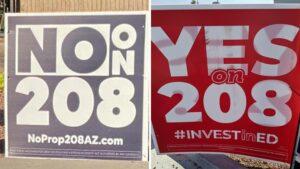
Photo Credit: KJZZ
Proposition 208, the significant tax increase narrowly approved by voters in 2020, is now on the ropes due to a recent decision by the Arizona Supreme Court. In a 6-1 vote, the court declared that if the funds raised by the new tax exceed the amount to be spent on education in a given year as per constitutional dictate, the proposition is obligated to be nullified.
The proposition involves a very significant tax increase on high earners in Arizona. Single filers earning over $250,000 a year and married filers earning over $500,000 would have seen their state income taxes rise from 4.5% to 8% per year. It was supported by educational organizations such as Invest In Ed, known for their organization of the Red for Ed rallies of two years ago. It was opposed by most business groups in the state, including the Arizona Chamber of Commerce, as well as Republicans at the legislature.
Ironically enough, the constitutional mandate comes from the voters themselves, as in 1980 Arizona voted to have education funding tied to inflation and student enrollment. In 2000, voters approved a 10% increase in funding via a dedicated sales tax, and two years later voted to exempt that sales tax from the cap to avert the issue that faces 208 right now. Ironically enough, if the tax increase had been via sales tax, it would have fallen under the purview of that proposition, and would not have faced the same legal challenge.
It is worth noting that based on the projections from Invest In Ed, the revenue would exceed that cap, thus bringing this ruling into play. However, those are simply projections, and as such this is a theoretical exercise at the moment. If revenue falls below projections, the proposition should still be considered law.
As our readers probably know Governor Ducey and the Republicans in the legislature passed legislation to bypass Prop 208 and to help ensure that overall tax rates don’t increase for high earners. The bill calls for a combined tax rate capped at 4.5%, seemingly taking into account the possibility of it being stricken down. As with most tax bills in the Arizona legislature, the votes were down party lines, with all Republicans in favor and all Democrats in opposition. The Invest In Ed coalition is currently pursuing legal options to challenge that legislation.
As is often the case with complex tax legislation, there are plenty of additional unknowns and questions, with some legal wrangling left to go. But at this moment, it seems like the small business owners, executives, and high earners of Arizona have won a very significant battle.

